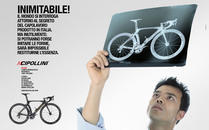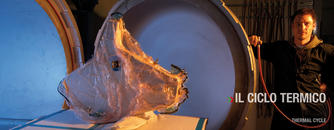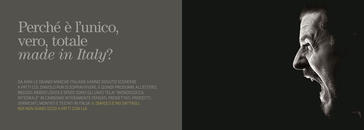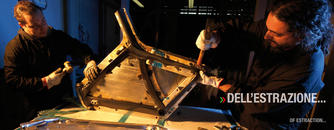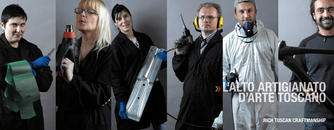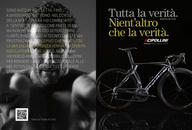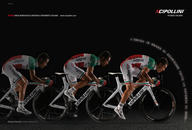In our portfolio you will find a number of projects that we have been working on during the past months: the new ad campaigns for Cipollini, Philippe Gilbert for DMT, Pippo Pozzato for Giordana; brand image and website for Master della Cucina Italiana; new websites for Suavia and Gusto per la Ricerca; and new brand image and catalog for Jacketinthebox.
The importance of “good faith”
“I have heard it said that in the ordinary transactions of life you foreigners attach a great deal of importance to the words 'good faith.’"
These are the words of Amitav Ghosh, Indian writer and anthropologist. They can be read in different ways. For me, however, the only reading is the (implicit) scandal of a sub-culture that is forced to wrap a cloak around the sacred values of all mundane activities, to protect themselves with their success, which should be discounted. The call for good faith is the real scandal (if we appeal to something is because it is not obvious). Ghosh’s comment appeared at the top of a page of the Sunday edition of Il Sole 24 Ore a few weeks ago. Just below it, there was an interesting article by Vincenzo Cerami describing a "good person" in this way: "It is not necessary to refer to society and its non-rules to define a good person. A societal category does not exist; it is lost in a sea of an omnivorous and varied Italy. It is secluded, oriented towards the paths of sobriety and honesty, moral and intellectual. A good person is the only anti-conformist citizen, that once we would have called the real revolutionary." One can argue about the details, but the words hit the mark. They are signs of a world turned upside down, of a scandal that no longer makes the headlines. Ghosh’s statement and the article by Cerami have touched a raw nerve. The resulting pain brought me up to date with the vitriolic statements against those who today, taking advantage of the crisis, happily commit abuses of dignity on hard-working individuals.
Here I should elaborate one the causes of the Italian crisis (which in the past few years has added to the global crisis, in no small measure) that I experienced professionally, in the first person. That is the misunderstanding of "Made in Italy"; the progressive, involuntary diffusion, therefore in "good faith,” of the only fundamental value of our economy. Instead of being protected by the institutions and the entrepreneurs themselves, Made in Italy has been debased, confused, deprived of dignity.
I have always worked for companies that produce niche goods for enthusiasts. Objects made with care and attention. Working with these companies exposed me to the production side of their business. The workers were almost always great craftsmen that took pride in their work, done painstaking precision and skill. To me, there in that mixture of skill and pride, was the beating heart of Made in Italy. It was a delight to see them work, mechanics, factory workers and artisans. With what dignity they stood in front of their works of art! And this pride was shared between the owners or managers of the companies, the workers (mechanics, factory workers and artisans), and us at the graphic design studio where we created and managed the brand images. An active flow of energy that made us believe we were a part of a true, great, exciting venture, in constant flux. But from a certain moment on, people began to say that if you weren’t producing your goods in Asia your company would die. And so it was, no doubt. We know almost everything about the grounds of this scandal, but I can’t begin to argue, I lack the tools and perhaps even intellectual serenity. Even several of our clients were forced to emigrate.
And as soon as they moved abroad: more numbers, more sales, more usefulness, more everything, and very much more. More of everything except soul, perhaps, which gets scattered on long flights and traded in far away continents. I still remember the precautions we took at the beginning when adding the little phrase “Made in Italy” to our advertising. We would ask ourselves: is this correct? I thought to myself: absolutely not. I thought we were losing irreplaceable value, the value of something that is (really) made in Italy. But as always, when there are huge amounts of money involved: the (fruitful) trick becomes a lawful deception (in order to produce more fruit). Take olive oil for example. All that is required for a bottle of extra virgin olive oil to be labeled Italian is a drop of oil made from olive grown in Italy). This holds true for other products as well. All that was necessary was for the “idea” or “concept” to have been created in Italy in order to wave the Italian flag. Once again, perhaps this is necessary in order to not loose ground on the international market. But the fact is that this perversion remains.
However, in recent years a glimmer of hope has appeared. A perfect example of this is the renewed hope is the Cipollini project. At the beginning of 2012, we were contacted by Federico and Philippe Zecchetto to coordinate the brand’s image and a new project that had just seen the light. In terms of the brand’s image, all that existed was the logo (luckily it was a Helvetica Italic that I simply restyled) and some bike investitures (which I proceeded to clean up.) There were two particularly magnificent carbon fiber monocoque frames, truly revolutionary, designed by Mario Cipollini and finished by Italian engineers. One of these frames, the RB 1000, was so breathtakingly beautiful, with details that immediately reminded me of certain Henry Moore and Constantin Brancusi sculptures. All produced in Italy. After two years, during which the brand has established itself strongly, I can go back in time to the first visit to their factory in Florence, where the carbon frames are still produced: it was like re-establishing a wire, to be part of a real, exciting, shared project. Something that filled us with pride, a pride not accrued on numbers, turnover, or profit. But based on ideas. On something simple and true, who had no need to degrade "good faith" in order to justify a product.


